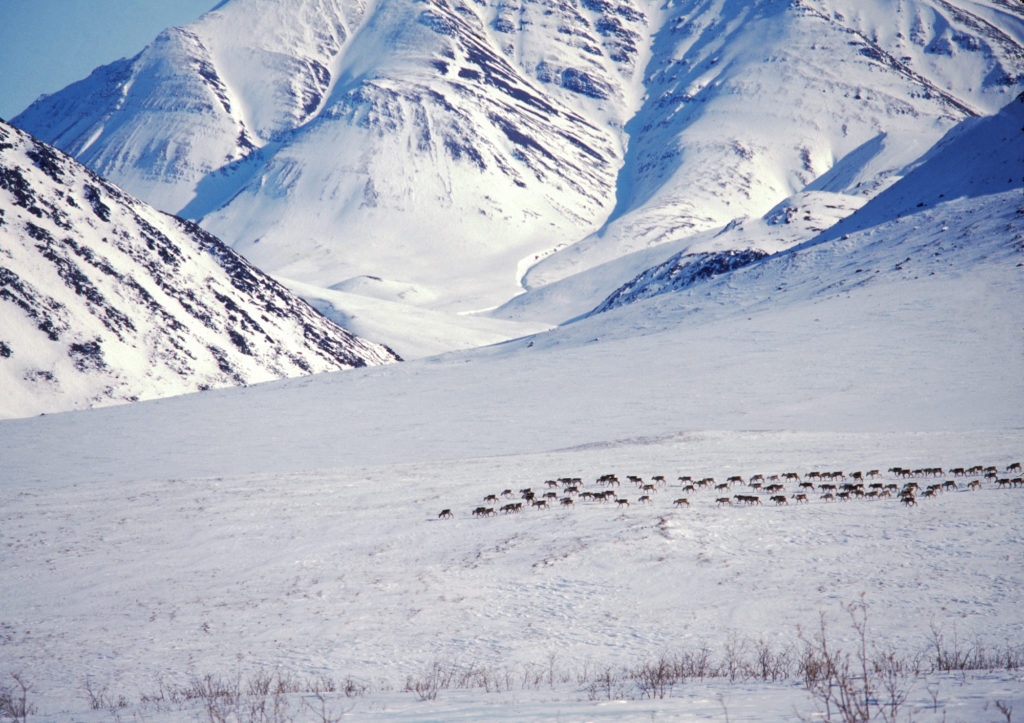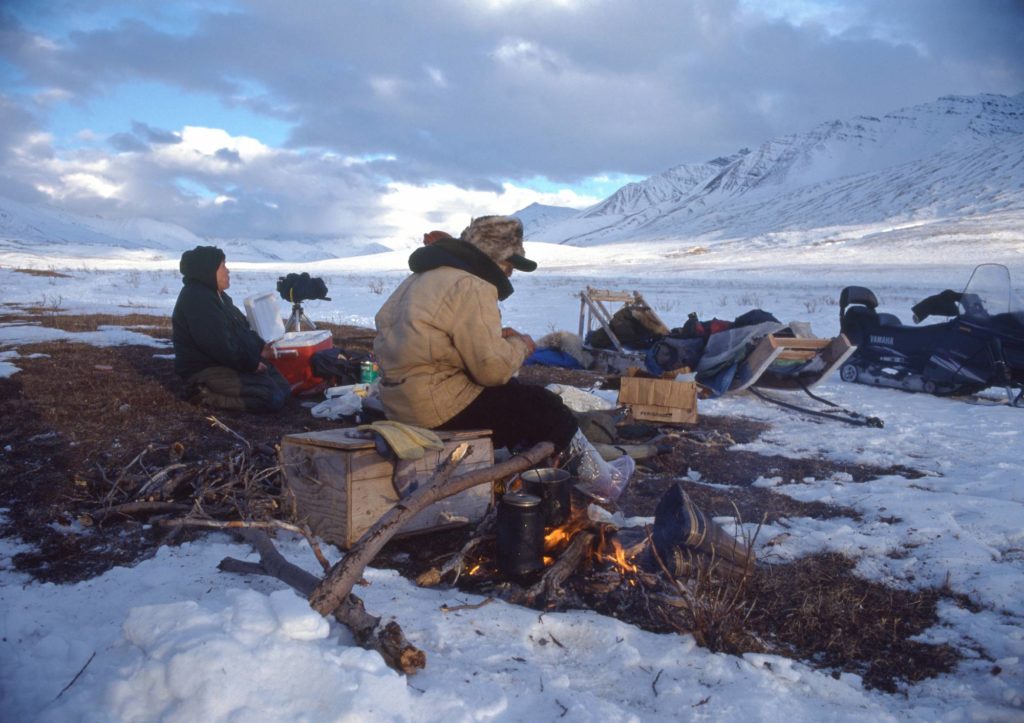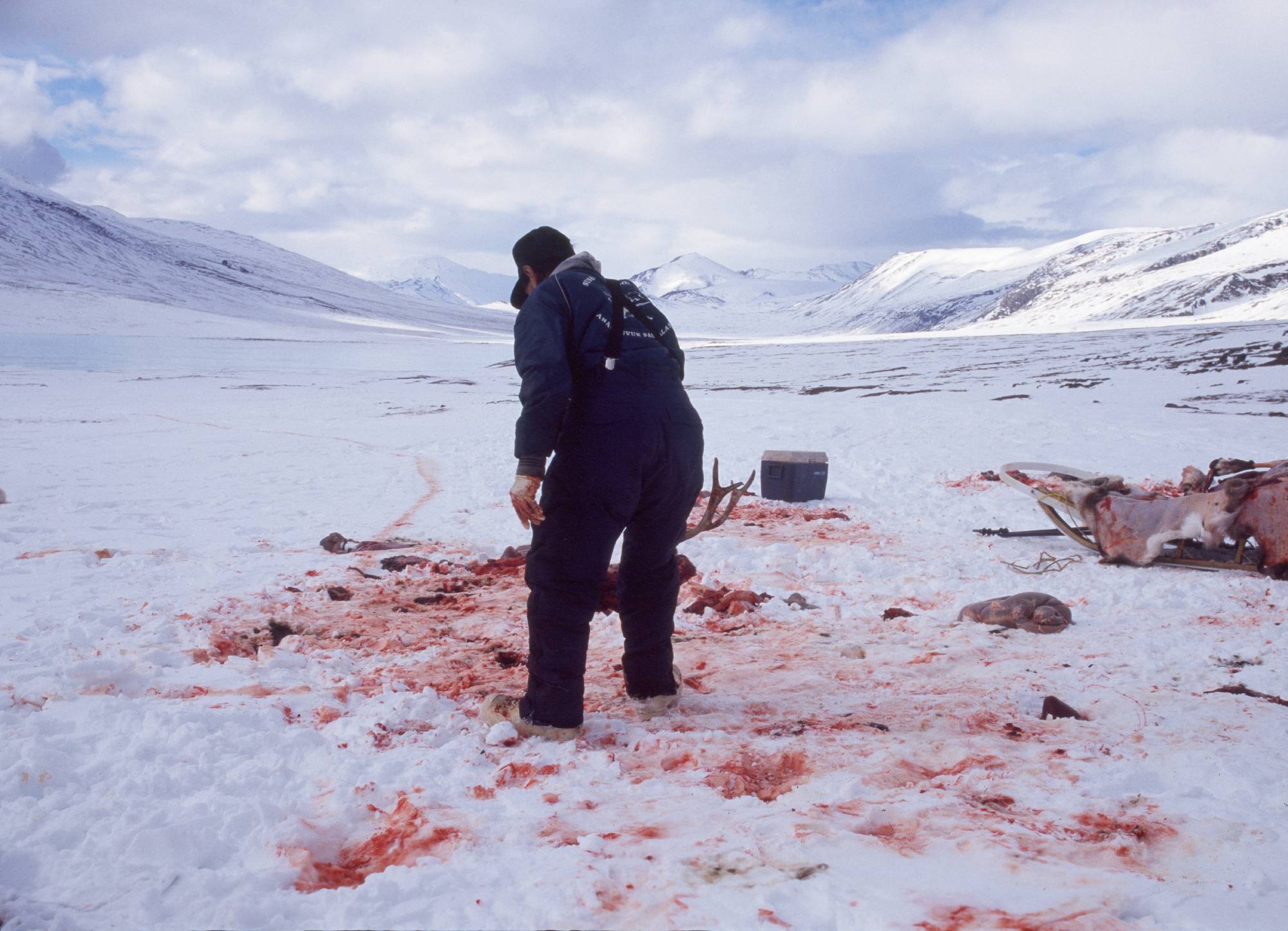This is the third of four posts on Experience that I introduced in Crossing an Ocean.
We came upon the hunters three hours snow machine ride north east of the village, in a broad mountain valley. Red trails led across the snow to where two men had dragged the caribou and where they were butchering the carcasses. They were old men and they each wore surgical gloves to work, bent over the meat with cigarettes in their mouths. The caribou were skinned and each animal divided. Their skin was then laid on the hunters’ sledges, the pieces of meat placed on it and wrapped against the cold. It was minus 15 degrees c.
Joshua went up to the group. They didn’t look up. Joshua greeted them and said something in Iñupiaq. They glanced down the valley and carried on working. I stepped up to the butchering place and made myself look at the viscera strewn across the snow. Amongst it was a pale, blue foetus. I thought to myself then that I had a choice: to be repulsed or to accept what I was about to experience. I chose to accept.
When they finished, the old men stiffly stood up, tore off their gloves and tossed them onto the remainder of the kill. They reached inside their jackets for more cigarettes and each lit one. Joshua asked them in English where the herd had gone. One of the old men pointed down the valley and said they’d run that way. We returned to our snow machines and set off to follow them.
After half an hour we caught sight of the herd higher up the mountainside, close to where a side valley came down from the north. We stopped our machines. I suggested that I climb up above the herd and push them down the mountainside towards Joshua and Rachel. They agreed that was a plan. I took the snow machine as high as I could, staying half a mile from the caribou. When I could go no further on the machine I continued by foot.

At the lip of the side valley I turned towards the caribou but they were nervous and moved up the mountainside and entered the small valley on the far side from me. They moved slowly and I followed them from my side, trying to get ahead of them to cut them off and force them back down to the guns. We climbed together and entered the cloud layer, and the caribou disappeared into the mist. It got colder and I could feel ice forming in my nose. I pulled the fur ruff on my hood forward round my face.
I continued walking. I thought that if I went far enough I might reach a pass and come down under the cloud and see the North Slope. From there, I thought that I might be able to see the coast and the Arctic Ocean where the world ended. I climbed and the valley went on into the cloud. There were few features, just snow and rock, and it didn’t end. After an hour I turned back.
When I got back to Joshua, Rachel and Justine they had lit a fire. There were no trees in these mountains, just dwarf willow down in the gulleys cut by streams. They had used this. The two old men had joined them. Their names were Samuel and Johnnie. I didn’t ask them what their names were in Iñupiaq. There was a can of snow hung over the fire, melting for tea. We took off our outer gloves and unpacked the biscuits and tinned fish we had brought. We offered them around. Samuel had a caribou leg. Holding the hoof, he lifted it up and bit into it, using his ulu to cut his mouthful free. He handed the leg to me. I took out my knife and clumsily copied him. The meat was already frozen on the surface and tasted metallic.
When we had finished eating everyone lit cigarettes. Joshua made the tea. Samuel took the leg bone, bare now and smashed it open with a rock. Using the tip of his knife he carefully picked the marrow out of the shards of bone and ate it. The sun came out and we talked about food. Do you eat white man’s food? Asked Rachel. We explained that we were white but now I think back at the question I wonder if they meant did we eat American food? We asked them about hunting. How often did they hunt? Rachel explained that her brother taught her to hunt when her husband was killed in a snowmobile accident, so she could provide meat for her family.

This is the third experience. Eating meat with Iñupiat hunters in the Arctic. I felt great privilege to be with people who moved with such grace and expertise through a landscape I found so alien, but also an unease about an imbalance in the relationship between us and them. There are many ways of describing this imbalance but I think the simple fact that we had travelled there to make a film about their life, and not the other way round, sums it up neatly.
When I was young I was an enthusiastic boy scout. In the Scout Handbook there was a picture of a scout sitting by a fire on a wild hillside, with a forest below him in the background. The image was incredibly appealing but it struck me, even at a young age, how unrealistic that was. I couldn’t enjoy that freedom in Southern England outside of a designated campsite, nor could I drink from a stream, or hunt animals for food. The picnic in the Brooks Range, Alaska, struck a deep chord within me. It was partly the realisation of a fantasy of the wilderness, and the atavistic pleasure in campfires, but I also recognised the expertise of my companions, and their distant forebears, in the skills I had learnt in the Scouts.
Scouting was the product of the British Empire, and its founder Baden Powell a lauded officer in the colonial military. Inevitably, his record has been reappraised, and he is subject to a number of serious allegations. I’m not going into that here, but regardless of the truth or otherwise of these allegations, Baden Powell was an agent of the colonial project. That explicitly involved the violent subjugation of native peoples, the theft of their land and extraction of the resources to be found there. Despite this, Baden Powell, a keen tracker from boyhood, learnt a great deal from his indigenous trackers, including African bushcraft, and whilst considering them inferior to white people, admired aspects of their culture. This was complemented by elements of culture and skill appropriated from indigenous Americans by Ernest Thompson Seton and shared with Baden Powell. These appropriated cultures, romanticised and barely acknowledged, found their way into Scouting. I’m deeply grateful for them, but the dark history of their provenance is troubling and I wonder now if that was partly the cause of the unease I felt whilst with Joshua, Johnnie, Samuel and Rachel.

Leave a Reply